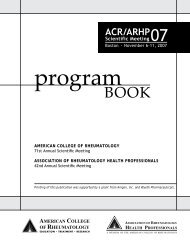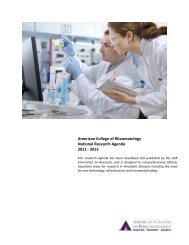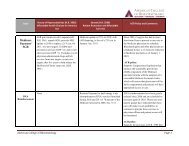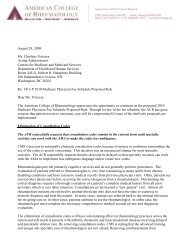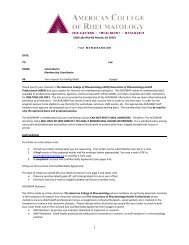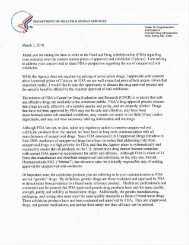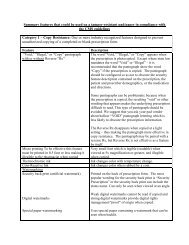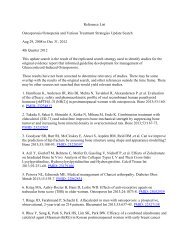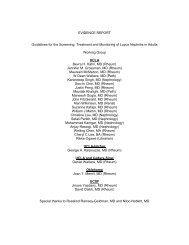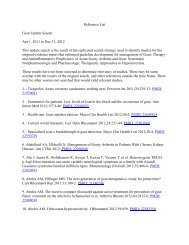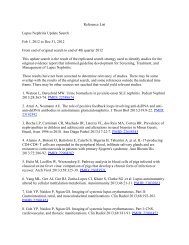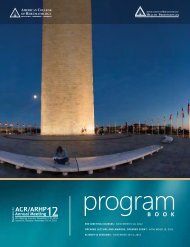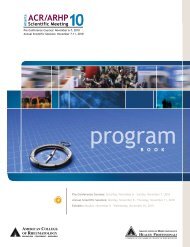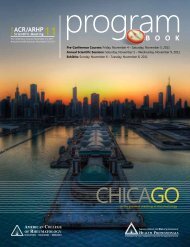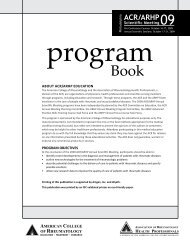Evaluation Tools
Evaluation Tools
Evaluation Tools
You also want an ePaper? Increase the reach of your titles
YUMPU automatically turns print PDFs into web optimized ePapers that Google loves.
<strong>Evaluation</strong> <strong>Tools</strong><br />
Cookie Reyes<br />
Fellowship Program Coordinator<br />
Clinical Administrator<br />
Hospital for Special Surgery
<strong>Evaluation</strong> <strong>Tools</strong> Used By Program For The Following General Competencies<br />
General<br />
Competencies<br />
Patient<br />
Care<br />
Medical<br />
Knowledge<br />
Interpersonal and<br />
Communication<br />
Skills<br />
Professionalism<br />
Practice Based<br />
Learning<br />
Systems Based<br />
Practice<br />
List of <strong>Evaluation</strong> <strong>Tools</strong> Used/In Development by the Program<br />
Attending<br />
<strong>Evaluation</strong>s<br />
Via E*Value<br />
Attending<br />
<strong>Evaluation</strong>s<br />
via E*Value<br />
Mini-CEX<br />
360 degree<br />
evaluations<br />
ROSCE<br />
Mini-CEX ROSCE Case<br />
Presentations<br />
Mini-CEX ROSCE 360 degree<br />
<strong>Evaluation</strong>s<br />
360 degree<br />
evaluations<br />
Case<br />
Presentations<br />
Walk Rounds<br />
Clinic<br />
Conferences<br />
360 degree<br />
<strong>Evaluation</strong>s<br />
ROSCE<br />
Attending<br />
evaluations<br />
via E*Value<br />
Attending<br />
evaluations<br />
via E*Value<br />
Attending<br />
evaluations<br />
via E*Value<br />
Case<br />
Presentations<br />
Attending<br />
evaluations<br />
Via E*Value<br />
Patient<br />
Surveys<br />
Patient<br />
Surveys<br />
Patient<br />
Surveys<br />
-Journal Club<br />
-In-service Exam<br />
-Research-in<br />
Progress<br />
Patient Surveys<br />
Mini-CEX
Mini-CEX<br />
(Consultation <strong>Evaluation</strong> Exercise)<br />
An attending supervises a fellow doing an examination<br />
on their patient<br />
Examination is specific to the patient’s complaint<br />
Attending evaluates:<br />
‣ Medical Interviewing skills<br />
‣ Physical Examination skills<br />
‣ Humanistic Qualities/Professionalism<br />
‣ Clinical Judgment<br />
‣ Counseling Skills<br />
‣ Organization/Efficiency<br />
‣ Overall Clinical Competence as a subspecialist
Mini-CEX<br />
(Consultation <strong>Evaluation</strong> Exercise)<br />
Other considerations…..<br />
‣ Patient demographics<br />
‣ New patient vs. revisit<br />
‣ Setting (ambulatory, inpatient consultation, other)<br />
‣ Complexity (low, moderate, high)<br />
‣ Time (# of minutes for exam)<br />
‣ Evaluator Satisfaction Rate<br />
‣ Fellow Satisfaction Rate
360 ° <strong>Evaluation</strong><br />
Fellows are evaluated by:<br />
‣Nursing staff<br />
‣Medical Assistants<br />
‣Social Work staff<br />
‣Office staff<br />
‣Volunteers<br />
‣Patients
Patient Survey<br />
From a patient’s perspective, this evaluates<br />
the fellows’ ability to:<br />
Not only hear but listen to the patient<br />
Become the patient’s advocate<br />
Explain complicated and confusing terms for patients to<br />
understand (i.e. meds., disease, etc.)<br />
Be courteous and respectful<br />
Be punctual
E*Value <strong>Evaluation</strong><br />
Web-based evaluation software that offers<br />
fellow assessments by the faculty (and<br />
vice versa):<br />
‣ Clinical judgment<br />
‣ Medical knowledge<br />
‣ Clinical skills:<br />
History taking<br />
Physical examination<br />
Procedural skills<br />
‣ Humanistic qualities<br />
‣ Professionalism<br />
‣ Medical care<br />
‣ Overall clinical competence as a subspecialist
Rheumatology Objective Structured<br />
Clinical Examination (ROSCE)<br />
Fellows are assessed based on their humanistic and<br />
interpersonal skills by attendings from an outside<br />
institution. These:<br />
‣ Are objective<br />
‣ Are patient centered<br />
‣ Provide immediate feedback using a forum which<br />
would not otherwise be employed in fellowship<br />
training
ROSCE<br />
Designed for:<br />
‣ Objective testing of trainees<br />
‣ Direct observation of student performance during planned<br />
clinical encounters<br />
Assessment using a variety of methods:<br />
‣ History taking<br />
‣ Examination skills<br />
‣ Advising patients<br />
‣ Interpretation of data
ROSCE: steps<br />
• Pre-ROSCE: fellowship director’s assessment<br />
of each of their own fellows<br />
• During the ROSCE: immediate written<br />
assessment of each fellow<br />
‣ Attending assessment:<br />
• Station-specific content<br />
• Professional qualities<br />
‣ Patient assessment:<br />
• Professional qualities<br />
• Validated questionnaire<br />
• Post-ROSCE: clinic patient assessment of<br />
fellow<br />
‣ Validated questionnaire
Logs<br />
Patient log<br />
‣ Computer-based list of all patients seen<br />
‣ Patient diagnoses<br />
‣ Date patient is first seen<br />
‣ Supervising faculty member<br />
Procedure log<br />
‣ Computer-based list of all procedures performed<br />
‣ Site and side (i.e. left knee, etc.)<br />
‣ Place and date of service<br />
‣ Supervising faculty member<br />
‣ If applicable, description of any complications or reactions
Fellow Portfolios<br />
Divided into:<br />
‣ Lists<br />
Procedure<br />
Patients seen in clinic<br />
– Sorted by diagnosis<br />
Patients seen in the consult service<br />
– Sorted by diagnosis<br />
‣ Practice-Based Learning<br />
Talks and presentations<br />
Literature searches<br />
‣ Systems-Based Practice<br />
Multi-modality approach involving various disciplines relating to a patient’s<br />
care<br />
Includes patient-related issues and problems<br />
Discussed with fellow and graded quarterly with associate program<br />
director
Research In Progress (RIP)<br />
Educational forum offering fellows the<br />
opportunity to present their ongoing<br />
research projects to the larger scientific<br />
community<br />
Allows for fellows to receive critical<br />
feedback on their project<br />
Affords the opportunity for patient<br />
recruitment for studies
Rounds<br />
Fellows present complex clinical cases to<br />
a gathering of faculty<br />
Allows for faculty input and feedback<br />
Affords opportunity to gather<br />
information/data necessary for research
A few points…<br />
All evaluation tools are:<br />
‣ Signed by the fellow<br />
‣ Signed by the evaluator<br />
‣ Signed by the Program Director<br />
‣ Individually discussed between the Program Director<br />
and fellow<br />
‣ If applicable, if remedial/disciplinary action is<br />
necessary, evaluation is discussed between Program<br />
Director, evaluator and fellow
Fellow <strong>Evaluation</strong> of the<br />
Training Program<br />
Anonymously submitted to the Program Director<br />
only<br />
Evaluates the program’s:<br />
‣ Clinical facilities (inpatient unit, clinic, etc.)<br />
‣ Clinical training<br />
‣ Faculty<br />
‣ Laboratory facilities<br />
‣ Adequacy of protected research time<br />
‣ Seminars, conferences, lectures
Thank you



